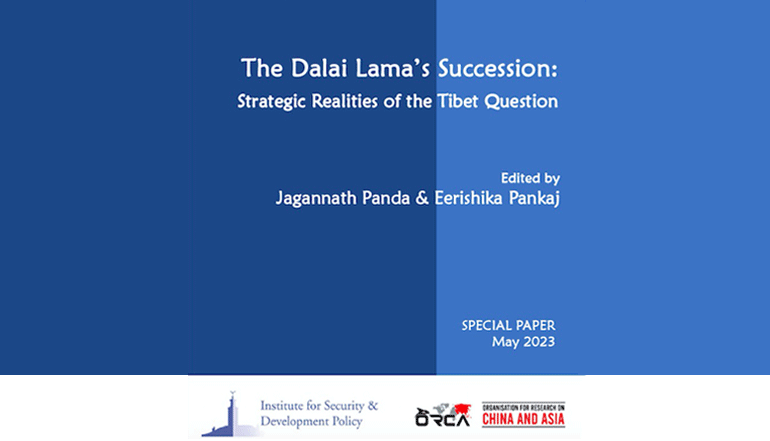The Institute for Security and Development Policy based in Stockholm, Sweden published a Special Paper entitled The Dalai Lama’s Succession: Strategic Realities of the Tibet Question in May 2023. Jagannath Panda, head of the Stockholm Center for South Asia and Indo-Pacific Affairs; and Eerishka Pankaj, director of New Delhi-based think-tank, the Organization for Research on China and Asia (ORCA) are the co-editors.
The paper features writing by 17 authors who share a wide range of opinions and perspectives on the Dalai Lama’s succession. The Chinese Communist Party has “put strategies in place to manage the post-Dalai era.” “Delhi’s official Tibet policy is ambiguous with the intention of engaging with the Tibetans without enraging China.” “Notwithstanding the Dalai Lama’s position in the reincarnation process, the Tibetan people in all probabilities will have two Dalai Lamas—one designated by their spiritual and temporal leader and the other by the PRC.” “Washington has more actively pre-empted attempts by Beijing to meddle in the succession process and The Tibet Policy and Support Act, which was signed into law in 2020, codified this position.” “China’s official media indicate that China now routinely calls on foreign governments to acknowledge China’s sole authority in the selection process for the next Dalai Lama and probably requires assurances that those nations will not host any candidate for 15th Dalai Lama on their soil.” “Despite China’s monumental arrangements in preparation for the coming succession struggle, its final goal of obtaining the support of the Tibetan population within Tibet and of world opinion remains distant and uncertain.” “The Dalai’s successor is most likely going to be found in India, from amidst the sixth generation of Tibetan Buddhist families in the country. There is an emergent need for New Delhi to have a clear policy on Tibet, and for the CTA to have a clear policy on its approach to India.”
The paper has three chapters: 1) Succession: From Tradition to Ideology; Succession: A Wider Worldview; and Succession: A Strategic Preview. The three topics under the first chapter are Reincarnation of the Dalai Lama: An Ideological Point of Contention Between China and Tibetans, Tenzin Lhadon; China’s Strategy and Thinking on the Succession of Dalai Lama, B. R. Deepak; Tibet in China’s Machiavellian Thinking, Baogang He.
2) Reincarnation System of Living Buddhas: A Taiwanese Perspective, Julie Yu-Wen Chen and Ute Wallenböck; Sweden and the Dalai Lama: Of Rights and Respect, Torbjorn Loden and Agust Borjesson; Interview with David Ståhl: EU, Sweden, and the Tibet Question; Britain, the Dalai Lama, and the Prospects for Post-Succession Planning, Gray Sergeant; The European Debate on the Next Dalai Lama: The Czech Discourse, Martin Hříbek; The EU and Beijing’s Interference in the Reincarnation of the Dalai Lama, Zsuzsa Anna Ferenczy; Japan and its Stake in the Dalai Lama’s Succession, Yoko Ishii.
3) The ‘Post-Dalai Era’ – The Party Prepares for the Tibetan Leader’s Death, Robert Barnett; Contested (Geo) Politics of Reincarnation and the future China-Tibet Relations, Dibyesh Anand; Reimagining Mongolian Buddhism in the Geopolitical Crack between China and the Dalai Lama, Uradyn Bulag; New Delhi’s (Un) Changing Policy toward Tibet, Krzysztof Iwanek; and Interview with Claude Arpi: Impact of the Succession Process on the India-China Border.


